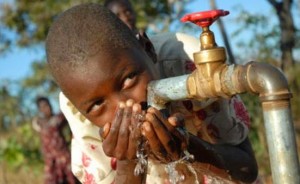Consultant attributes more plastic usage to inadequate quality water
 Madam Bertha Darteh, a Consultant for the Ministry of Sanitation and Water Resources (MSWR) has attributed the high usage of plastic in the country to the inadequate access to quality pipe borne water.
Madam Bertha Darteh, a Consultant for the Ministry of Sanitation and Water Resources (MSWR) has attributed the high usage of plastic in the country to the inadequate access to quality pipe borne water.
She said the revelation came when the ministry took the initiative to ascertain the fundamental reasons why people had to use a lot of plastics and concluded that one of the realities of the matter was about low access to quality water.
Madam Darteh was speaking at a Multi-Stakeholder dialogue in Accra organised by the United Nations Development Programme, Ghana (UNDP Ghana) to brainstorm and share knowledge on how to curb the plastics menace in the country.
She said if people could be assured of easy access to quality water, the Ministry was of the firm belief that the use of plastics would reduce.
She also attributed the reasons for minimal impact on management of plastic waste to the absence of collaboration and noted that, “no matter how the good some private initiatives were, we would not see the impact strongly if it is being done on a small scale.”
She said the ministry sought to promote coordination and harmonization among these private organisations.
Madam Darteh revealed that the ministry had issues surrounding how to gain access to finance and making incentives available for service providers to provide better services.
Mr Oliver Boachie, Special Assistant to the Minister of Environment, Science, Technology and Innovation disclosed that government was partnering with the World Economic Forum to implement a new programme called Global Plastic Exchange Partnership (GPEP) which is a partnership made up of global businesses, international donors, national and local government, community groups and world class experts.
He said a team from Nairobi will be in Ghana to have further discussions with key stakeholders with the goal of launching GPEP in Ghana in July this year.
“GPEP has selected only two countries in the world to implement this programme; the first is Indonesia with Ghana being the second”, he added.
Mr Desmond Appiah, Sustainability and Resilience Advisor, AMA noted that the Assembly had been consistent with the enforcement of arrest and prosecution of people who were dumping waste indiscriminately.
“Virtually every month, people are taken to court for sanitation offences. Just over the quarter if this year, we have taken over 120 people to court at the local level”, he said.
“We have renovated the sanitation courts that within the old AMA boundaries to be sure that the Justice System has a conducive environment to carry out its mandate”, he added.
The meeting, which was to stimulate partnerships and accelerate the delivery of tangible solutions for plastic management in Ghana, had over 100 stakeholders in attendance.
Participants were drawn from the Ministry of Environment, Science, Technology and Innovation (MESTI), Ministry of Sanitation and Water Resources (MSWR) and the Accra Metropolitan Assembly (AMA).
Private sector Stakeholders present were the Department for International Development (DFID), Ghana Recycling Initiative by Private Enterprises (GRIPE), Environmental Service Protection Agency (ESPA) and representatives from the University of Ghana.
DFID, GRIPE, ESPA and the representatives from the University of Ghana took turns to also disclose their initiatives towards plastic management, challenges and way forward.
GNA
